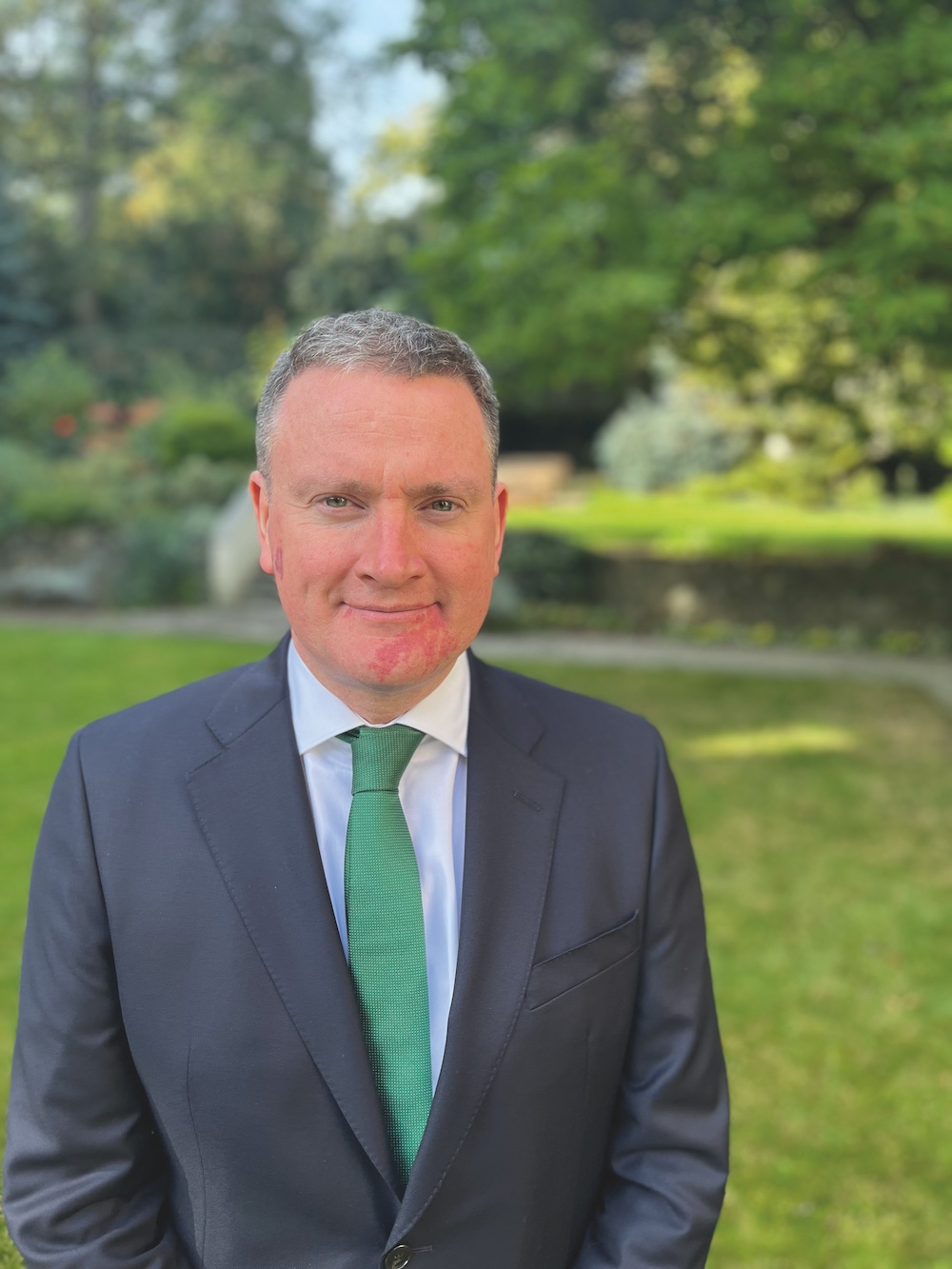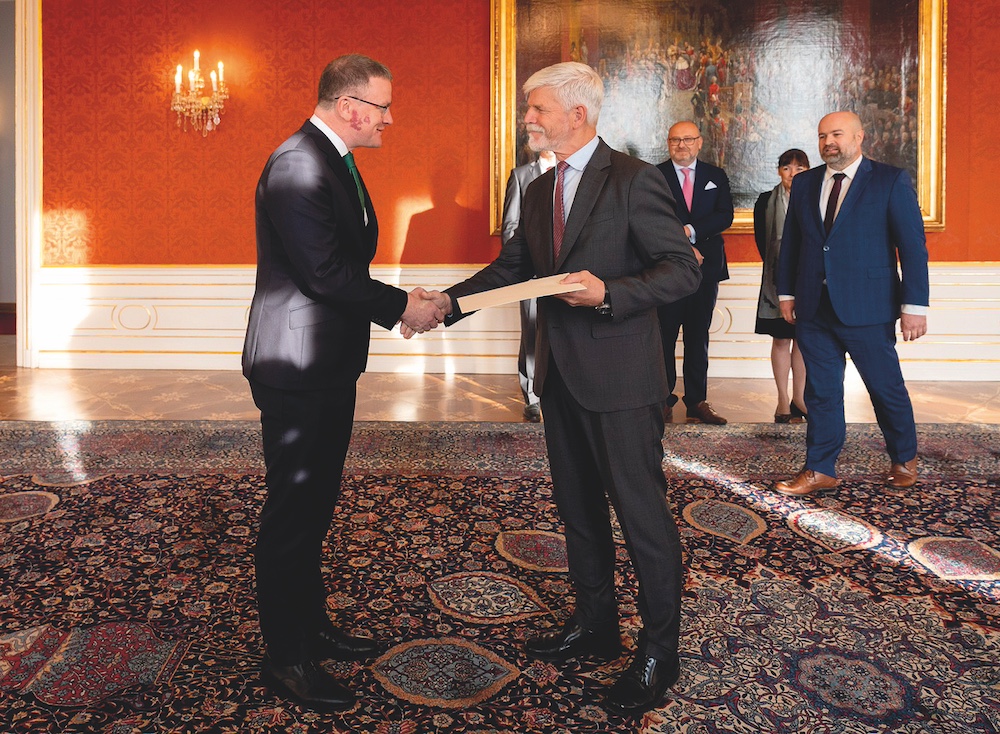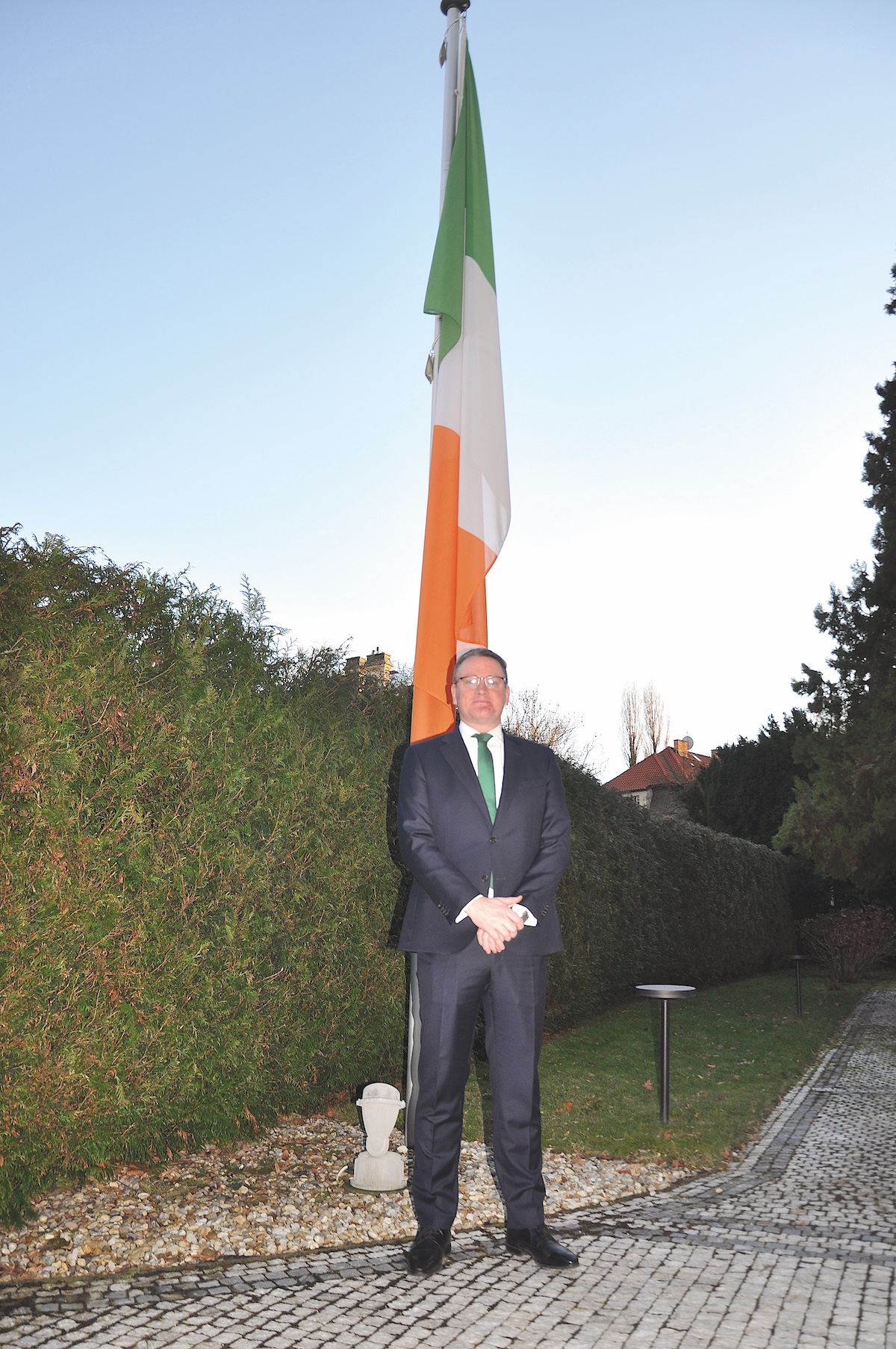“The EU will continue to evolve positively”

H.E. Mr. Alan Gibbons, Ambassador of Ireland
Text: Martina Hošková, M.Zisso; Photo: Archive
From being the youngest of twelve children in an Irish farming family and reading newspaper headlines to his father on the way to school, to the assignment as the head of the Embassy in Prague; that is what the path of gaining experience has looked like so far for H.E. Mr. Alan Gibbons, Ambassador of Ireland. What does he love about his dream job? Why does he expect some celebrations connected to both countries this year? And what does he have to say about the past and current state of the European Union?
Tell us about yourself.
I am the youngest of twelve children – which was a 1950s Irish family, although I was not born until the 1970s. I grew up in the countryside near the town of Kilkenny, in the southeastern part of Ireland. My parents were farmers, so there was always work to be done, but great to have lots of older siblings to clear the path ahead. I am married, and my spouse is a university professor in Dublin, joining me in Prague outside term time.
What brought you to a diplomatic career path?
My interest in the world outside came firstly, I think, from my parents. As a primary school child, each morning on the way to school with my father, we would stop and get the daily newspapers and it was my job to read the headlines, while he drove the car. News and current affairs were always an important part of discussions around the family dinner table while I was growing up. So, studying Economics and Political Science in university was a natural progression of those interests. While in university, I had the opportunity to study for a year abroad under the European Union’s Erasmus programme. That year in Belgium provided a great framing for me of Ireland’s place within the European Union. After completing a further year of post-graduate studies, my mother, who was both hugely committed to education and had a keen interest in politics, drew my attention to the fact that the Irish Foreign Ministry was recruiting – I literally jumped on my bike and rode to the recruitment centre to submit an application just ahead of the deadline. Following a recruitment process, I was eventually accepted.
How many countries have you served in up until now?
I have had the opportunity to undertake six assignments in five different countries during my career to date. I have been very fortunate to have had a real mix of roles – in bilateral Embassies, in Copenhagen, Washington D.C., and now in Prague; as well as in multilateral settings, including in our Mission to the UN in New York. I also had the opportunity to undertake a number of secondments to work within other organisations for a period, including with the Slovenian Foreign Ministry in Ljubljana, with the Asian Development Bank in Manila, as well as with Ireland’s Prime Minister’s (Taoiseach’s) Office in Dublin.
Being an ambassador and your lifestyle – is it a good fit?
To represent your country abroad is a great honour, and to do that at the level of Ambassador is the honour of a lifetime. As my assignment to Prague is my first as an Ambassador, I have been very fortunate to come to work with a great team of colleagues who have been absolutely invaluable to undertaking the role. The role works well with my personal – as well as professional – interest in societies and their political, economic, and cultural relations. To be honest, it’s a dream job.
Does the dream job have some not-so-easy aspects too?
As mentioned, my spouse is a university professor in Dublin, so during the teaching term he is based in Dublin. Outside term time, he is able to work remotely from here in Prague, which allows us to be together.
Fortunately, Prague and Dublin are just a two-hour flight away and the air links between the cities are extremely good, with multiple direct flights in both directions every day of the week, so we manage to make bilocation work.

Petr Pavel, President of the Czech Republic and H.E. Mr. Alan Gibbons, Ambassador of Ireland
It hasn’t been long since you arrived in Czechia. What have your first impressions been?
That is very true, I arrived in the Czech Republic at the very end of the summer last year, so have been here for just a few months. My initial impressions have been hugely positive. I am so fortunate to have great colleagues, a very active and welcoming community, and have benefitted from very warm welcomes in my interactions. Prague, of course, is an amazing and engaging city.
I am looking forward to getting out to visit as much as possible of the beautiful Czech lands, beyond Prague, during the coming months.
Can you evaluate the current status of Czech-Irish relations?
I am very fortunate that the state of Czech-Irish relations is excellent, so I will have the opportunity to build on very strong foundations of friendship and cooperation. Across almost every facet of our relations, Ireland and Czechia share similar approaches – both being Members of the European Union, we share a broad set of values, interests, and perspectives. As smaller, open, trading economies, we both rely on the international rules-based order, grounded on a strong and effective multilateral system, to provide the framework for the peace and prosperity enjoyed by our people. At times of turmoil this is all the more the case.
The economic, trade, and investment relationship between Ireland and the Czech Republic is strong and growing. Fortunately, like any good and sustainable relationship, our economic relationship is strong in both directions, with each country playing to its strengths. Ireland is a top twenty trade partner for Czechia, while the Czech Republic is a priority market for Ireland.
2024 marks the twentieth anniversary of the Czech Republic’s entry to the European Union. That happened on 1st May 2004 at a ceremony in Dublin, while Ireland held the Presidency of the Council of the European Union. Marking, and indeed celebrating, this significant milestone will be a great opportunity to mark the strengthening of our cooperation and partnership. We will actively participate, including with some visitors from Ireland, in a number of celebratory events to mark this important anniversary.
I have to mention also the strength and vitality of the cultural links between Czechia and Ireland, whether it is the interest in Irish music, song, and dance, or Irish literature – in either the Irish or English languages – there is a very deep well of engagement on the part of large numbers of Czech people. The Centre for Irish Studies at Charles University does extraordinary work in this area, which the Irish Government is proud to support.
Ireland joined the EU much sooner than Czechia, in 1972. Did the reality meet the expectations?
Last year saw Ireland mark our fiftieth anniversary of joining the EU, or the European Economic Community as it was then known. We were beneficiaries of the first enlargement of the EU in January 1973. The previous year, in a referendum, the Irish people had voted to approve accession, with more than 83% voting Yes.
The last fifty years of EU membership have been transformational for Ireland. That has not just been in economic terms – gaining access to a vastly larger market for our goods and services exports, as well as in the early decades, significant Cohesion support – but perhaps just as importantly, EU membership has seen Irish society evolve and open up, and become a far more diverse and inclusive place for all.
In spite, or perhaps because, of the major challenges which Europe has faced over the last decade and a half, Ireland remains a committed and steadfast Member of the European Union. Critically also, the EU remains extremely strongly supported by the Irish people. The Irish people value and appreciate the solidarity and support provided by the EU, as well as the vast opportunities that abound.
Which changes and improvements should the EU pursue these days?
The European Union is a unique construct internationally. Nowhere else in the world have 27 sovereign countries come together freely to decide to endeavour to do more and better together than any one of them could do individually. That in many ways is the genius of the European Union – it is a voluntary coming together. The Member States are part of the Union because they want to be, and they see utility in such close and wide-ranging cooperation. It is a Union of compromise and negotiation, where Member States do not necessarily get all they want all the time, but it is very clear that the EU delivers for our citizens on a daily basis and has presided over an extraordinary zone of peace and prosperity.
The EU has throughout its existence changed and evolved to respond to the realities, and also to the opportunities, of the time. Those realities and opportunities have included expanding from an initial group of just six countries, to today including 27 European countries freely and voluntarily cooperating. The Enlargement of the EU is again very much centre stage in terms of EU policy discourse. As has been the case throughout its history, I am absolutely confident that the EU will continue to evolve to address realities and opportunities, and that will be done on the basis of negotiation and compromise.

“My assignment to Prague is my first as an Ambassador.”
Based on your experience, can you give a piece of advice to the next generation of ambassadors?
Firstly, I would congratulate that next generation. It is a really great job that they are assuming. Serving as your country’s Ambassador is an opportunity to make a contribution, and is of course a responsibility. Diplomacy is as important today as it has ever been. I would encourage someone taking up the role to retain their openness and curiosity. To get beyond the Embassy as much as possible, and to interact and engage outside. And perhaps most importantly, to enjoy the experience.
This interview is done on the occasion of your national day. Do you have a wish for your country? And perhaps for the Czech Republic?
Yes, we celebrate Ireland’s National Day, St. Patrick’s Day, on and around 17th March each year. It is a golden opportunity to highlight the role, contribution, and potential of our small country, which is dynamic, outward-looking, and welcoming.
This St. Patrick’s Day – my first in the Czech Republic – I look forward to further strengthening the already excellent relations between Ireland and Czechia, through a series of events and engagements which the Embassy will collaborate on with our Czech friends, as well as with the Czech Irish Business and Cultural Association (CIBCA), the Centre for Irish Studies at Charles University, and the Prague Hibernians GAA Club, among others.
On this St. Patrick’s Day, I wish for a peaceful and prosperous year ahead for both Ireland and the Czech Republic.

